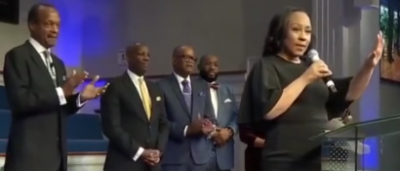Legal/Law/Criminal Justice and Reform
Fani Willis’ Lover Tries To Stop His Former Divorce Attorney From Talking To Judge

Screenshot/Rumble/Atlanta Berean Church
Fulton County special prosecutor Nathan Wade on Thursday sought to block a closed-door meeting between his former divorce attorney and the judge who will soon decide whether District Attorney Fani Willis should be disqualified from the case against former President Donald Trump.
Terrence Bradley, Wade’s former law partner and attorney for his divorce, did not directly answer many questions about Wade’s relationship with Willis during last week’s hearing, claiming attorney-client privilege prevented him from doing so. Judge Scott McAfee indicated at the hearing that he would later hold a private “in-camera” review with Bradley to sort out the privilege claims.
Wade argued in a Thursday filing that such a meeting “may unlawfully compel Bradley to disclose communications with Wade that the Court has already determined are protected.”
“Nothing under Georgia law authorizes the Court to conduct such an examination once the determination has been made that attorney-client privilege applies, and should the Court compel the disclosure anyway, it would vitiate one of the oldest and most fundamental privileges recognized both at common law and by statute,” his attorney, Andrew Evans, wrote in the filing.
“Moreover, the Defendants were allowed broad leeway to pry into the private life of Special Prosecutor Wade in an unprecedented and public manner, spanning two full days of testimony,” the filing continues. “The Defendants sought to introduce intrusive and legally irrelevant personal details of multiple people’s lives for the world to watch unfold in real time, but still no credible evidence exists in the record to support their tenuous claims.”
Nathan Wade is asserting privilege, and it is his burden to prove that this was a communication in the course and scope of representation.
If the judge does not hear Bradley’s statements, he can’t determine if Wade met his burden.
So this motion is dumb. https://t.co/OFaURsg6VR
— Andrew Fleischman (@ASFleischman) February 22, 2024
During the hearing, a long-time friend of Willis testified that her relationship with Wade began in 2019, long before his contract started, noting she saw them hugging and kissing. Bradley, while unable to directly answer questions, did confirm that he was sent a draft copy of the motion to disqualify Willis and responded in a text message that it looked “good.”
Willis and Wade maintained that their relationship began in 2022. They said there were no receipts showing Willis reimbursed him for travel expenses because she paid in cash.
During the hearing, Bradley claimed he could not say why he left the firm he worked at with Wade due to attorney-client privilege, only to later state that he left due to allegations of sexual assault against him. The incident caused McAfee to say he wondered if Bradley had “been properly interpreting privilege this entire time.”
“The Court should not conduct the examination under any circumstance,” Wade’s filing continues. “The attorney-client privileged communications at issue between Wade and his own former attorney Bradley, made during the course of and in relation to Bradley’s representation of Wade, must be protected from disclosure.”
All content created by the Daily Caller News Foundation, an independent and nonpartisan newswire service, is available without charge to any legitimate news publisher that can provide a large audience. All republished articles must include our logo, our reporter’s byline and their DCNF affiliation. For any questions about our guidelines or partnering with us, please contact [email protected].

